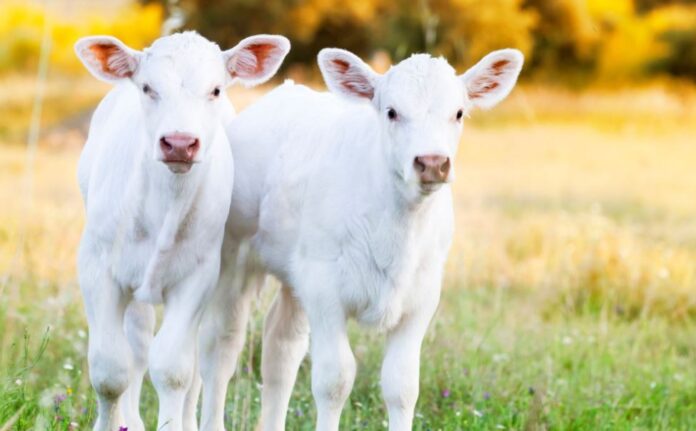In a groundbreaking experiment at the University of California, Davis, researchers are working to curb methane emissions from cattle, a major contributor to climate change. The project aims to genetically modify gut bacteria in cows to reduce or eliminate methane production, offering a sustainable solution for the livestock industry.
Tackling Methane’s Climate Impact
Methane, a greenhouse gas more potent than carbon dioxide but shorter-lived, accounts for nearly half of the global temperature rise, according to UC Davis animal science professor Ermias Kebreab. “If you start reducing methane now, we can actually see the effect on the temperature very quickly,” he noted.
Cattle farming is a significant methane source, with a single cow emitting around 220 pounds of the gas annually through burping. Researchers believe that modifying the microbes in cows’ stomachs could drastically cut these emissions.
A scientist uses a tube to extract liquid from a two-month-old calf, Thing 1, as part of a research project focused on reducing methane emissions from cows. The study aims to modify cow gut bacteria to prevent methane burps, a potent greenhouse gas.
The Experiment in Action
Paulo de Meo Filho, a postdoctoral researcher at UC Davis, extracts liquid from the rumen—the first stomach of a cow—for analysis. This liquid contains microbes responsible for converting hydrogen into methane, which the animal then releases into the atmosphere.
The study involves calves like “Thing 1,” which are being fed a seaweed-supplemented diet known to reduce methane. The team is working to replicate these effects by introducing genetically engineered microbes that redirect hydrogen away from methane-producing bacteria.
Balancing Act for Cattle Health
The research team, led by Matthias Hess at UC Davis, approaches the modification process with caution. “We can’t just simply cut down methane production by removing methane-making bacteria,” Hess warned, highlighting the risk of hydrogen buildup, which could harm the animal.
By simulating cow stomach conditions in bioreactors, the scientists test different microbial formulas to ensure safety and effectiveness.
Boosting Sustainability and Productivity
The project, which involves collaboration with UC Berkeley’s Innovative Genomics Institute (IGI), has received $70 million in funding and aims to achieve a breakthrough within seven years.
Beyond cutting emissions, researchers hope to enhance feed efficiency. “Hydrogen and methane are both energy. If you reduce that energy loss and redirect it, we achieve better productivity and lower emissions simultaneously,” said Kebreab.
Addressing Global Needs
Kebreab, a long-time advocate for sustainable livestock practices, emphasized that reducing meat consumption is not a universal solution. In countries like Indonesia, where 20% of children under five face stunted growth, increasing meat and dairy production remains vital. “We can’t tell them to not eat meat,” he said.
With the ultimate goal of creating a single-dose treatment for early-life administration, the researchers hope to revolutionize livestock farming while addressing climate concerns. This innovation could pave the way for a more sustainable agricultural future.



